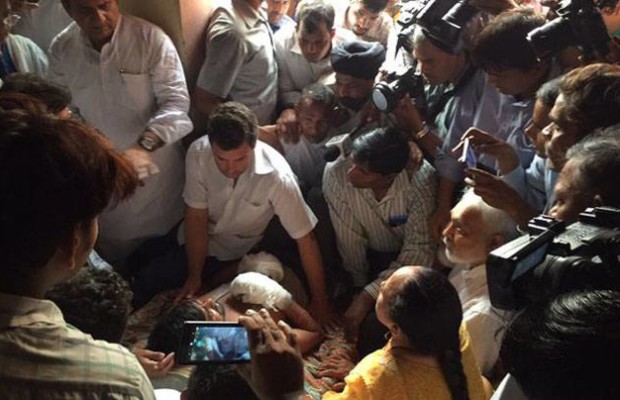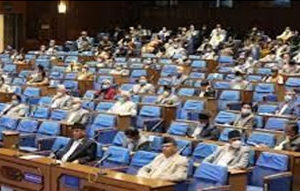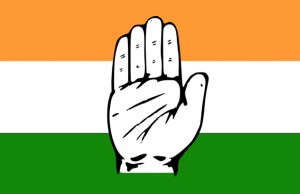RAHUL GANDHI AND DALIT MIND SPACE

Dalits now vote for issues like development and aspiration. This is the reason that Modi could successfully trap them.
Rahul Gandhi’s recent efforts to reconnect with Dalits are giving sleepless nights to his political opponents. Though he has been stressing the need for refreshing the efforts to connect with Dalits since the beginning of his political career by paying personal visits to Dalit households, his bid to reach out to the backward community saw a big jump last month when he took the political center stage of the protests over the suicide of Dalit research scholar Rohith Vemula. The support he received at Hyderabad Central University was unprecedented.
The announcement by Rahul of a comprehensive blue print of his Dalit politics in the middle of this month in Lucknow will be giving a fresh boost to Congress’ prospects nationwide. Despite always keeping Dalits at the center of policy-making by erstwhile Congress governments, Rahul’s party had to pay a huge price in last few years because of disconnect with its traditional Dalit support base. The 2014 general election, where all of 17 Scheduled Caste seats in Uttar Pradesh went to the Bhartiya Janta Party was an eye opener to the Congress leadership and Rahul decided to reclaim the decades-old traditional roots of Dalit politics. It has become clear in past years that Dalits are no longer voting merely on identity.
Therefore, Rahul focused on implementing Dalit-centric sub-plans in every state Congress rules. Rahul made it clear that instead of giving freebies, taking steps to create jobs for them in the private sector should be the route of their empowerment. Rahul wants all the Congress ruled states to ask every company with more than a 100 employees to submit the caste composition of their organisation. The companies having less number of Dalit employees could also be pushed to employ more Dalits.
Dalits constitute nearly 17 percent of the Indian population. They now vote on issues like development and aspiration. This is the reason that Modi could successfully trap them with his 3-D message of hope and change. The boats which went by the Modi tide are now disillusioned. Modi government’s failure to do much about its own election slogan “sabka saath, sabka vikas” has created an opening for any party able to offer something more substantial than rhetorics. Mayawati’s Bahujan Samaj Party is also losing ground both nationally and in its home state of Uttar Pradesh. Rahul’s strategy to push all the levers to shift various vote bases in Congress’ favour is thus well timed. Nationally, Dalits cast fewer votes for the BJP than any other group, except Muslims. BJP is identified as an elite party in terms of class and caste. Rahul’s efforts will ensure that BJP and BSP face rough roads in future to get Dalit support. Congress is not far away from the Dalit narrative in history, it has only lost ground over the last few decades, which can be regained with sincere hard work.
Rahul has remarkably knocked the BJP government off course in the Dalit mind space with two issues—Land Acquisition Bill and Bhim Rao Ambedkar. By pressing for forward movement on previously blocked legislation relating to the SC promotions quota in government jobs, and for amendments to the Scheduled Caste and Scheduled Tribes (Prevention of) Atrocities Act, aimed to provide special courts for trying offenders and rehabilitating victims, Congress has earned its political goodwill. The proposal for private sector reservations for Dalits has been floated by the Congress earlier as well. Rahul wants to go in this direction with new vigour. The Congress is focusing on urban, educated, unemployed Dalits as the road to the Dalit underclass goes through the Dalit middle class, which builds the opinion.
Rahul also believes that the Congress requires new and effective set of Dalit leaders and intermediaries to be able to reach out to the community. For that, the Congress needs to reinvent its party machinery. Congress will soon see inclusive governance at every level of its organisational structure involving Dalits by putting them in charge of the implementation, monitoring and evaluation of Dalit schemes. Congress has finalised its Dalit plan especially for Uttar Pradesh, West Bengal, Bihar, and Tamil Nadu—the states account for nearly half of the country’s Dalit population. U.P. Has 20.5 percent of the total Scheduled Caste population, followed by West Bengal with 10.7 percent. Bihar with 8.2 percent and Tamil Nadu with 7.2 percent come third and fourth respectively. India has nearly 21 crore people belonging to various Scheduled Castes. Dalit population showed a decadal growth of 20.8 percent, whereas India’s population grew 17.7 percent. But many states with a considerable number of Dalits do not have proper legislations to protect the interests of the community.
Time and again Rahul Gandhi had tried to underline that in his brand of politics, Dalits and Tribals enjoy a special focus just as farmers do. His statement mentioning the “Jupiter’s escape velocity” for empowering Dalits had a clear idea that it will need the maximum thrust to push the community out of the lowest strata of society. Rahul had also declared himself a soldier of the tribals of Niyamgiri. Even when his own party was in power at the Centre, Rahul persuaded legislations one after another for entitlements reaching out to Dalits and Tribals. The Congress’ concern for Dalits also has an undeniable electoral sub-text. The last general election, where the Congress scored its lowest tally, it got just 3 out of 84 seats reserved for the Dalits, two in Karnataka and one in Telangana. In contrast, the BJP got 40 Dalit MPs across the country. In 1967, 45.2 per cent of the Dalits voted for the Congress; this figure rose to 52.8 percent in 1980.
But by the late 1980s, this share declined; and only 31.4 percent in 1996 and 29.9 percent in 1998 voted for the Congress. There has been a sharp decline in this percentage in last one and a half decades. To turn the wheel to its three decades old position, one needs a constant strive to give his best efforts. It is good that Rahul Gandhi, in a pivotal role to steer his party in its hour of crisis, understands that there is no other way to revive the Congress’ independent political standing in the long run but to win back the trust of Dalits and Tribals.




You must be logged in to post a comment Login